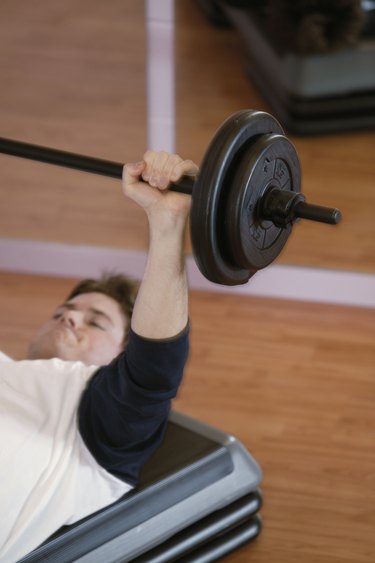
Sinusitis, a deviated septum, gastroesophageal reflux disorder or chronic dry mouth may cause pain in the roof of your mouth when you over-exercise. The nasal cavity is located directly above the roof of your mouth. Vigorous activity increases your blood flow, body temperature and breathing rate, which make nasal problems more noticeable. If you regularly experience pain in the roof of the mouth, consult with your doctor.
Identification
Video of the Day
You may feel sinusitis behind your nasal bones, cheeks, forehead and in the palate of your mouth. The pain you experience after over-exercising with sinusitis is pressure-like pain. Sometimes it feels like you have a toothache in your front teeth; a sore throat and nasal congestion are often present. A deviated septum can obstruct one or both of your nostrils. You may notice the deviated septum more while performing vigorous exercise if you breathe through your nose because the nasal blockage can cause pressure in the roof of your mouth. If the deviated septum is from a recent injury, you may feel pain in the roof of your mouth while exercising. The symptoms of gastroesophageal reflux disease can mimic sinusitis. You may also notice frequent heartburn, difficulty swallowing, a lump in your throat and increased mucus in your throat. Chronic dry mouth can also irritate the roof of your mouth during vigorous exercise.
Video of the Day
Causes
Excess mucus blocking the sinus, which allows bacteria, viruses or fungus to infect the sinuses, causes sinusitis. A respiratory infection, asthma, allergies, a deviated septum and GERD can all result in sinusitis. Increased mucus production from asthma and allergies is worse during vigorous physical exertion. You may be born with a deviated septum, or it can result from trauma to the nose. GERD is caused when the sphincter between your stomach and esophagus does not close properly, so stomach acids and ingested foods travel back up the esophagus. If acid travels into your sinuses while you are performing exercises that require you to lie down, you will feel the pain in your sinuses and roof of your mouth. Dry mouth can cause pain in the roof of the mouth since gulping large amounts of air through the mouth during vigorous exercise can cause inflammation.
Treatment
If sinusitis is caused by a viral infection, it will need to run its course. Otherwise an antibacterial or antifungal medication will be prescribed. You can treat the pain with a warm wash cloth on the face and sitting in steam after exercising. If you have an underlying condition that causes your sinusitis, you will need to treat this condition. Asthma can be treated with quick relief inhalers or long-term medications. Allergies can be treated with antihistamines and immunotherapy. You can control GERD with prescription-strength antacids, but you may need surgery to fix the sphincter. Surgery also can fix a deviated septum. Nasal cortisone sprays and decongestants can help control excess mucus during vigorous activity. If you experience dry mouth, increase your fluid intake before, during and after exercise.
Prevention
Avoid sinusitis by treating underlying conditions and avoid respiratory infections. Get an influenza vaccination yearly and wash your hands frequently. If you have a sinus infection, avoid pain in the roof of your mouth by lowering the intensity of your exercise and avoiding putting your head down. A deviated septum can be difficult to prevent, but you can reduce your risk by wearing helmets and seat belts. To avoid symptoms of GERD while exercising vigorously, do not wear clothes that are tight on the waist and avoid exercises that involve bending over. Avoid large meals before exercising and common GERD triggers, such as coffee, tea, fatty friend foods and spices. Learn how to breathe through your nose to minimize discomfort from a dry mouth.